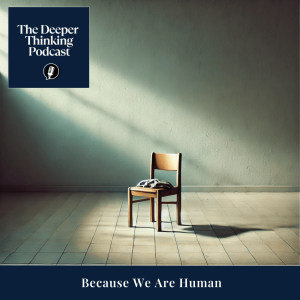
Monday Mar 24, 2025
Because We Are Human – The Deeper Thinking Podcast
Because We Are Human
A young woman sits alone in her car outside a grocery store, not because she’s shopped, but because she’s trying to find the right words to ask strangers to save her life. Her illness is not new. What’s new is that she has no insurance. No job. No safety net. She’s been told she needs surgery—and now, she’s being told she has to make it persuasive. Choose the right photo. Write a compelling story. Make people believe. In that moment, she is no longer a person in pain. She is a pitch. And that is the world many of us live in—one where survival is a performance.
This episode does not open with answers. It opens with a tension: the moral weight of need in a world that sorts the worthy from the unworthy. We follow that thread into a deeper question—what would change if we began not with scarcity, but with dignity? If needs weren’t treated as evidence of failure, but as universal entitlements?
Through the ideas of Immanuel Kant, who defined dignity as intrinsic and non-negotiable, and Hannah Arendt, who warned us about what happens when people are stripped of the “right to have rights,” we explore how systems encode beliefs about human worth. The episode is shaped by the moral clarity of James Baldwin and the spiritual severity of Simone Weil, who both called us to recognize suffering not as failure, but as a mirror. And we pause in a moment of history when this moral vision was real—when nations tried to build dignity into the structure of daily life.
What remains today is not just policy, but memory. Memory of a promise: that no one should have to qualify for care. That dignity isn’t something you earn—it’s something you protect. This is not a story of utopia. It’s a quiet reminder: we’ve done this before. We’ve built systems that began with the belief that to be human is enough.
There are nations where being alive once meant something more than being useful. Where a person could be poor, or sick, or still—and still be given what they needed. Not out of pity. Not out of charity. But because, at some point, there was agreement: the human fact was enough. Being free means free from these crippling fears. It might be difficult to imagine walking into a hospital and being asked nothing. No identification. No insurance. Just a name, perhaps, or not even that. This the foundations of the health care in most of Europe for over 70 years.
Beneath this architecture was an idea neither new nor naïve. The moral language of Immanuel Kant, filtered through war and ruin, had become civic scaffolding: the belief that each person held a value beyond use, a dignity that could not be weighed against budget lines or public sentiment. It echoed again in the Universal Declaration of Human Rights, where shelter, medicine, and education were named not as goals, but as rights. The echo still rings, though faintly, through hollowed-out institutions and automated voices asking callers to please hold.
A chair appears. Worn, wooden, back straight. Sometimes in a hospital corridor, sometimes at the edge of a benefits office. Always empty. Always waiting. The chair does not belong to a single person; it is not marked or numbered. It is for whoever arrives next. A gesture, not of luxury, but of readiness. One could build an entire ethics around that: a chair that waits not for the right person, but the next one. everyone in need.
Further Reading
As an affiliate, we may earn from qualifying purchases through these links.
📖 The Second Sex by Simone de Beauvoir – A foundational text on recognition and embodied dignity.
🔗 Amazon affiliate link
📖 The Human Condition by Hannah Arendt – On visibility, voice, and what it means to appear in the world.
🔗 Amazon affiliate link
📖 The Fire Next Time by James Baldwin – A moral reckoning with power, poverty, and dignity.
🔗 Amazon affiliate link
📖 Gravity and Grace by Simone Weil – Mystical, severe, and morally demanding reflections on affliction.
🔗 Amazon affiliate link
📖 The Idea of Justice by Amartya Sen – On fairness, freedom, and the real-world application of justice.
🔗 Amazon affiliate link
Abstract
This essay explores the moral architecture of dignity in modern society, tracing the quiet erosion of systems that once provided universal care without condition. Using postwar Britain as a historical lens, it reflects on the philosophical legacy of Immanuel Kant and the practical implementation of his ethical ideals in public institutions like the NHS, public housing, and education. Through recurring imagery and cultural memory, the essay questions how dignity was operationalized, how it was lost, and what remains of it in contemporary policy. It suggests that dignity, once designed into daily life, now lingers as both memory and moral imperative. The essay avoids polemic, instead offering a reflective meditation on readiness, worth, and the quiet violence of conditional care.
Bibliography
Arendt, Hannah. The Human Condition. Chicago: University of Chicago Press, 1958.
Baldwin, James. The Fire Next Time. New York: Dial Press, 1963.
Kant, Immanuel. Groundwork for the Metaphysics of Morals. Translated by Mary Gregor. Cambridge: Cambridge University Press, 1998.
Sen, Amartya. The Idea of Justice. Cambridge, MA: Belknap Press, 2009.
United Nations. Universal Declaration of Human Rights. Paris: United Nations General Assembly, 1948. https://www.un.org/en/about-us/universal-declaration-of-human-rights
Weil, Simone. Gravity and Grace. Translated by Emma Craufurd. London: Routledge, 1952.
No comments yet. Be the first to say something!